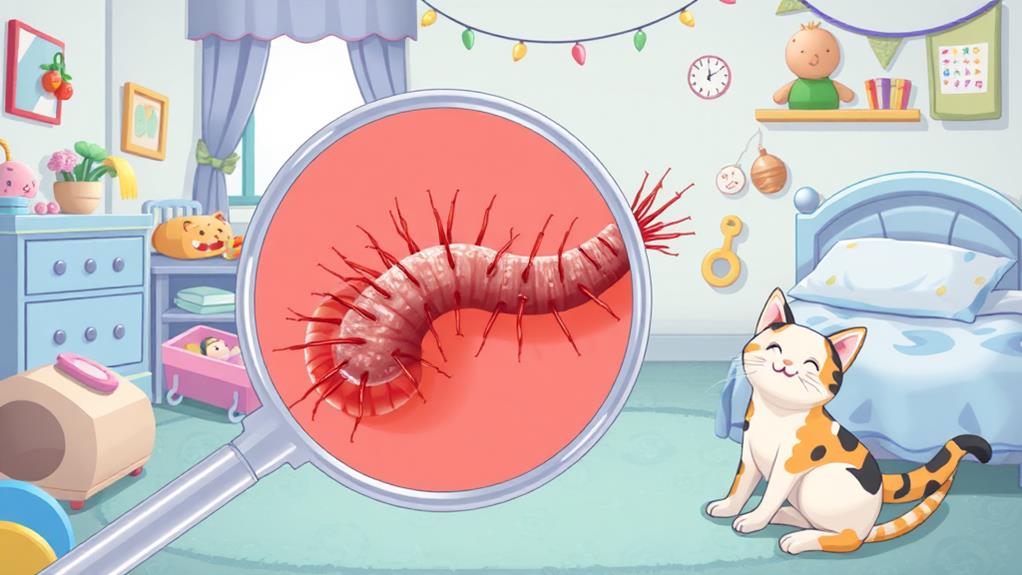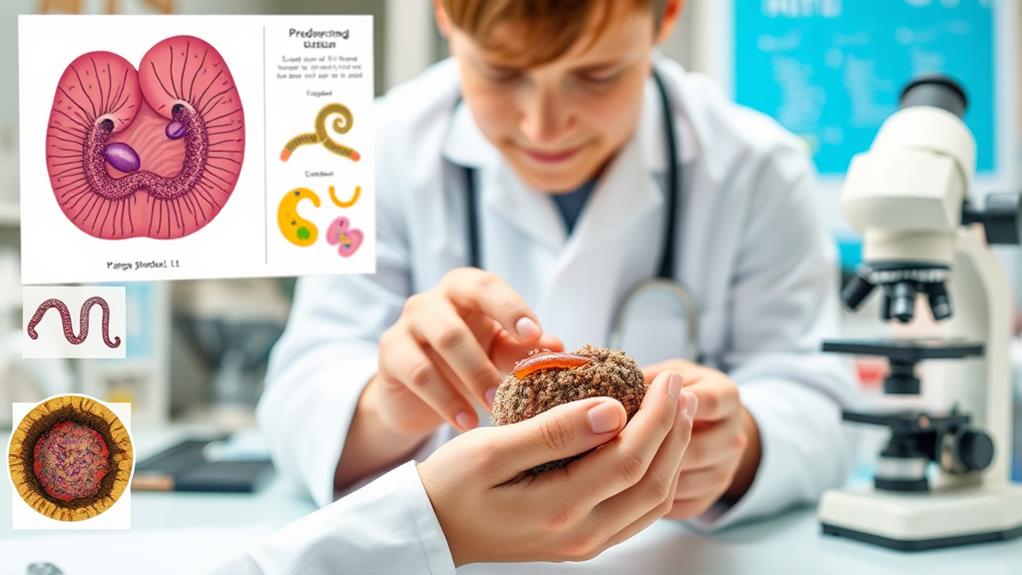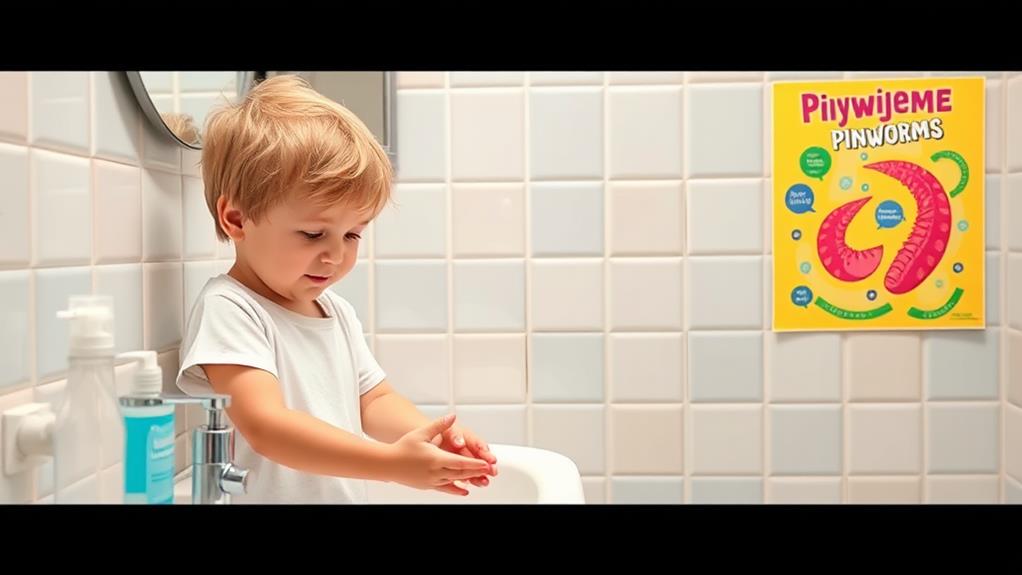If you've noticed your child scratching at night or experiencing stomach discomfort, it might be time to consider pinworms, a common issue among kids. These tiny parasites can cause significant discomfort, but understanding the symptoms and treatment options is crucial for effective management. You'll also want to explore how to prevent future infections, as maintaining good hygiene can make a big difference. However, knowing when to consult a doctor can be just as important—so what signs should you be on the lookout for?
Overview of Pinworms

Pinworms, tiny parasitic worms that primarily affect children, are a common cause of sleepless nights and itchy bottoms. They're actually quite small, measuring around a quarter of an inch, making them hard to spot.
You might wonder how these little creatures invade your home. Pinworms typically spread through the ingestion of their eggs, which can be found on contaminated surfaces like bedding, toys, and even under your child's fingernails.
Once ingested, the eggs hatch in the intestines, and adult worms make their way to the rectum to lay more eggs, causing that infamous itch. The good news is that pinworm infections are common and generally easy to treat. Most children will experience a pinworm infection at least once, so you're not alone in this situation.
Maintaining good hygiene is essential for prevention. Regular handwashing, especially after using the bathroom and before meals, can help minimize the risk of transmission.
Keeping your child's nails trimmed and clean also reduces the chance of eggs being transferred. Awareness and proactive measures are key to keeping your home pinworm-free.
Common Symptoms in Children
When kids become infected with pinworms, they often show specific symptoms that can be quite distressing. One of the most common signs is intense itching around the anus, especially at night. This itching occurs because female pinworms lay their eggs in that area, causing irritation. Your child might also experience restlessness during sleep, leading to a cranky morning.
Other symptoms can include stomach pain, nausea, and sometimes even a loss of appetite. You might notice your child feeling more irritable than usual, which can be frustrating for both of you.
If the infection persists, you may see signs of a secondary infection due to scratching, which can lead to redness or inflammation around the anus.
In some cases, pinworm infections can go unnoticed, as kids may not always express what they're feeling. Keep an eye out for any unusual behavior or complaints, as early detection is key to managing this condition.
If you suspect your child has pinworms, it's important to consult a healthcare professional for guidance on treatment options and how to prevent future infections. By staying informed, you can help your child feel more comfortable and get back to their playful self.
Diagnosis and Testing

Diagnosing pinworm infections in children typically involves a straightforward process. First, you'll want to observe your child's symptoms, like itching around the anus, especially at night.
If you suspect pinworms, you can take a closer look using the "tape test." This is a simple method where you place a piece of clear tape around your child's anus before bedtime. In the morning, remove the tape and check it for tiny, white pinworms or their eggs.
Next, you should contact your pediatrician to discuss your findings. They may recommend bringing the tape to the office for further analysis. Sometimes, doctors can also diagnose pinworms based on your child's symptoms and physical exam, so don't hesitate to share any concerns you have.
In some cases, your doctor might suggest additional tests if the diagnosis isn't clear.
Remember, while pinworms are common and generally harmless, it's important to seek a professional opinion. Early diagnosis means you can start any necessary treatment sooner and help your child feel comfortable again.
Plus, understanding the diagnosis will empower you to take the right steps for prevention in the future.
Treatment Options Available
Effective treatment options for pinworm infections in children typically include over-the-counter medications and prescription drugs.
The most common over-the-counter treatment is pyrantel pamoate, which you can find at your local pharmacy. This medication works by paralyzing the worms, allowing your child's body to expel them naturally. It's usually given in a single dose, but you may need to repeat it after two weeks to ensure all the worms are gone.
If over-the-counter options don't work, your pediatrician might prescribe medication like mebendazole or albendazole. These medications are effective and are often taken in a single dose, similar to pyrantel, but they may require a follow-up dose after a couple of weeks.
In addition to medication, it's important to wash your child's bedding, pajamas, and underwear regularly to prevent re-infestation.
Make sure they practice good hygiene, like washing hands frequently, especially before meals and after using the bathroom. These steps will help ensure that the treatment is effective and that pinworms don't return.
Effective Prevention Strategies

After addressing treatment options, focusing on prevention will help keep pinworms at bay. One of the best strategies is to encourage good hygiene habits in your kids. Make sure they wash their hands thoroughly with soap and water, especially after using the bathroom and before eating.
Teaching them to scrub their nails and the spaces between their fingers is essential, as pinworm eggs can easily hide there. You should also keep their nails short to minimize the chances of eggs getting trapped under them.
Regularly washing bed linens, pajamas, and towels in hot water will help eliminate any lingering eggs. Vacuuming your home frequently, especially the bedrooms, will also reduce the risk of spreading pinworms.
If your child has been infected, consider assigning them a separate towel and washcloth to use during treatment. Encourage them not to scratch the anal area, as this can spread eggs to their hands and other surfaces.
Lastly, talk to your child about the importance of not sharing personal items like hats or hairbrushes, as this can also help prevent pinworm transmission. With these strategies, you can significantly reduce the risk of pinworm infections in your home.
When to See a Doctor
If you notice persistent itching around your child's anus, especially at night, it's time to consult a doctor. This itching is a common symptom of pinworms, but it can also indicate other issues.
If your child is scratching so much that it disrupts their sleep or daily activities, don't hesitate to seek medical advice.
You should also see a doctor if you spot any visible pinworms in your child's stool or around their anus. Even if you see a few, it's essential to get a proper diagnosis and treatment plan.
If your child experiences significant abdominal pain, unusual irritability, or changes in appetite, these could be signs of a more serious issue, requiring prompt attention.
While pinworms are treatable, waiting too long to address the problem can lead to complications.
If your family has a history of pinworm infections, or if you suspect your child may have contracted them, don't wait to get help.
Your doctor can guide you on the best course of action, including medications and preventive measures, ensuring your child gets back to feeling comfortable and healthy.
